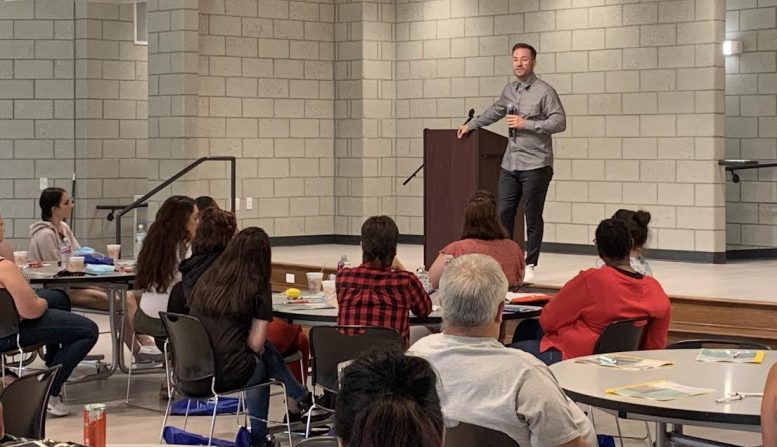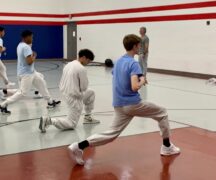BY ANDREW BAILEY
BG Independent News Correspondent
The stigma against former and recovering addicts prevents them from re-entering society, and often sends them back to the prisons and treatment centers they were released from, motivational speaker Tony Hoffman said.
By sharing his story at the Veterans Memorial Building in front of an audience of about 30 people, and around the country as one of the most requested substance abuse speakers in the nation, he hopes to break this stigma and get communities to provide more support for those struggling with alcohol and drug addictions.
Hoffman, a former BMX pro and Olympic coach, began by sharing a hypothetical scenario: if you saw someone draining water from a gutter to be used for fentanyl or heroin, what would you think of them?
He said the all-too-common response is that they chose a life of drug addiction, or they should be locked up in prison.
It’s a response Hoffman has faced too, as he had scaled houses in Clovis, California, as a young adult to drain gutter water.
He grew up with social anxiety, and while playing basketball as a 10-year-old, his father never showed up to his games because he was working 14-hour days to provide for his kids. Hoffman said consistently waiting for his father to show up created a “belief system” of inadequacy.
“It gave me the mindset of ‘I can’t, I won’t, and I’ll never be able,’” he said.
He had many prospective passions. He got into BMX racing, and was on the cover of a national BMX magazine at 18 years old. He had a six-figure salary offered to him in the technology field.
But anxiety, isolation-induced depression, and suicidal thoughts had been with him for most of his life.
To calm his nerves in social situations and cope with his relationship with his father, he saw using drugs —beginning with marijuana, and eventually moving into oxycontin and harder drugs — as the solution.
At this point, he had passed through “an invisible door.”
“That door is incredibly hard to come back from,” he said.
He’s seen 14 friends pass through this same door, all of whom died.
He’s one of the lucky few who rehabilitated, and he is now 14 years sober. But his story is an exception, he said.
Many rehabilitation centers have strict rules on who can be admitted and have a “30-day babysitting period” which is too short for meaningful progress to be made.
This leads to a cycle, where addicts are imprisoned or enter rehabilitation, but fall back into addiction due to a lack of support from their families and communities, he said.
“You have to change the way you think, the way you talk, the way you walk … and that is almost impossible under the systems we have now,” he said.
Hoffman’s addictions led to a four-and-a-half-year imprisonment for breaking and entering in 2007. While in prison, a quote he read incentivized him to change his life for good and pursue professional BMX once he got out.
“The quote read, ‘Be careful what you think, because your thoughts become your words. Be careful what you say, because your words become your actions. Be careful what you do, because your actions become your habits. Be careful what you make your habit, because your habits form your character. Then your character becomes your destiny.’”
Once released in 2008, he got back on his bike without losing a step. He won multiple races and was even asked to train for the Olympics. But after injuring his ankle and leg in an accident on the course, his dreams were dashed, and he was back to square one.
He had a brief period where he reconsidered using again, but he saw the crossroads he was at as a test.
He had found spirituality through a friend and started to develop a daily routine that could keep him goal-oriented and healthy.
He switched to coaching BMX, and started the FreeWheel project, a non-profit to mentor youths in action sports.
But recently released from prison, he struggled to find paying work as a coach, so he did it for free until he began to get paid for coaching and motivational speaking after about a year.
He reiterated that he was lucky in this regard. His hard work paid off, but hard work can’t always beat societal stigma and lack of support from the government.
His speaking took off, and now he travels the country. His coaching took off, and he watched a trainee of his at the Olympics. He found spirituality and happiness, and he is 14 years sober as of May 14.
But he still faces stigma. He said as a “recovered junkie,” some think he doesn’t deserve to be a part of “normal society.” This stigma often stops others, and they continue in a cycle until they die, or are imprisoned for life, he said.
In order to fix treatment centers and prisons, he said the solution is in hiring caring employees, using Fortune 500 companies as an example.
“In Fortune 500 companies, if you’re not putting in the effort every day to make it better, you’re gone. They’ll find someone who can do it better,” he said.
By following a structure like this, prison guards and treatment center employees that abuse their power or “are just babysitters” can be replaced with those who want to see improvement.
But that’s just one solution to one problem.
After re-entering society, Hoffman said long-term, sustainable housing is necessary, so people don’t have to sleep on the streets like he did.
And providing jobs is another important step. Hoffman said his father would hire ex-gang members and recovering addicts, “who turned out to be some of the most trustworthy people my father has ever worked with.”
These problems exist because the government doesn’t provide enough assistance, he said.
The solutions need to come from community members, breaking the stigma at the local level first.
“We need to do this because the government won’t do it for us,” Hoffman said, citing the inadequacies in prison systems and rehabilitation centers he discussed.
One attendee asked Hoffman what they could do in the Bowling Green community.
Hoffman advised looking to community leaders for assistance in getting projects off the ground.
He said a priest at his local church gave him the ambition and tools to start the FreeWheel project.
He explained three steps to accomplish a community-oriented goal:
- Figure out who you want to help
- Figure out how you want to help them
- Figure out who can assist in getting started
Hoffman said with these steps in mind, anyone can serve their community and spread goodwill.
“I’ve seen this process in action, and it works. I’ve seen addicts leave treatment centers and prisons, and if they don’t have a community that will help them, they usually go right back.”
Hoffman’s speech was presented by the Wood County Addiction Task Force, part of the Wood County Alcohol, Drug Addiction and Mental Health Services Board.





